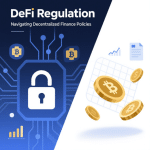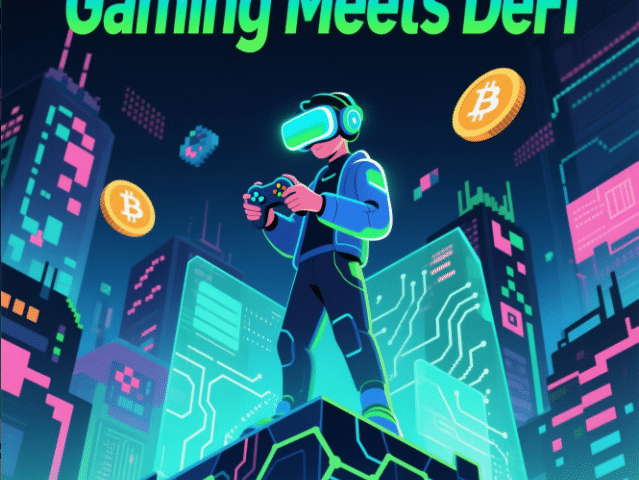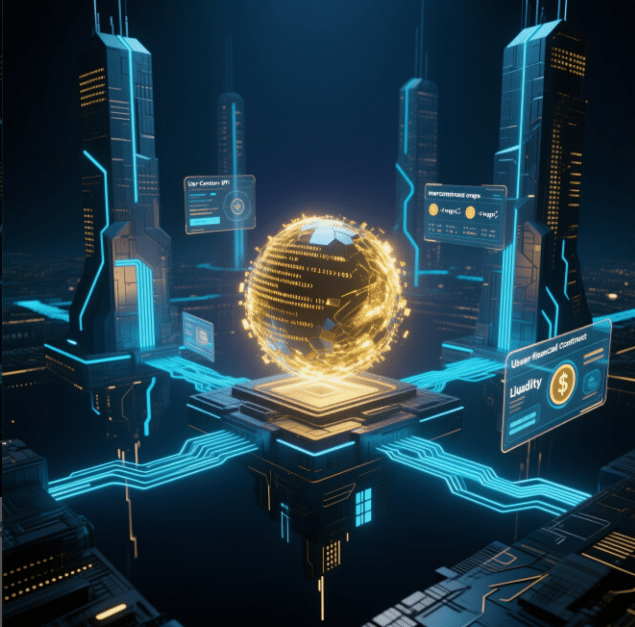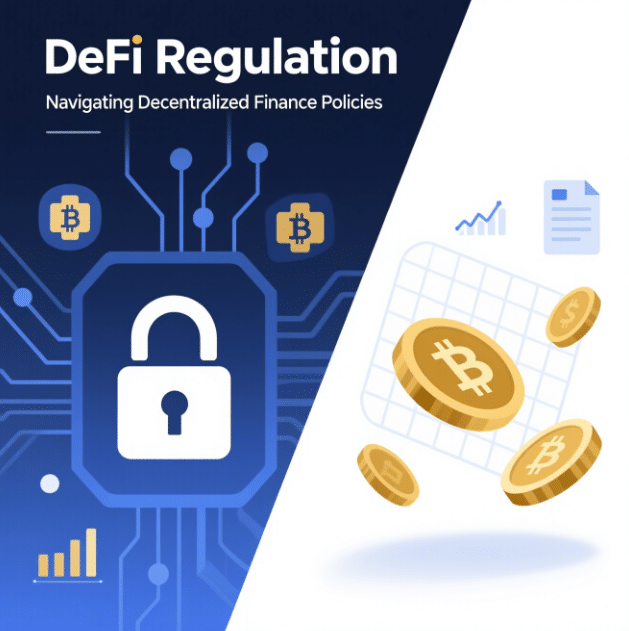
The Environmental Impact of DeFi: Are Blockchains Becoming Greener?
August 24, 2025
Regulation and DeFi: Can Decentralization Survive Government Oversight?
August 24, 2025
Qwen3-235B-A22B-2507
Title: Gaming Meets DeFi: The Emergence of Play-to-Earn and DeFi-Fi Games
In recent years, the digital world has witnessed a groundbreaking convergence between two revolutionary industries: blockchain gaming and decentralized finance (DeFi). This fusion has given rise to a new paradigm in the crypto space — Play-to-Earn (P2E) and DeFi-Fi games — where players are not just entertained but financially empowered. As the boundaries between gaming, finance, and ownership blur, platforms like Exbix Exchange are positioning themselves at the forefront of this transformation, enabling users to seamlessly trade, invest, and participate in the next wave of digital economies.
This article explores the evolution of Play-to-Earn ecosystems, the integration of DeFi mechanics into gaming, and how platforms like Exbix are bridging the gap between gamers, investors, and developers in this rapidly expanding universe.
The Rise of Play-to-Earn Gaming
The traditional gaming model has long been one-sided: players spend money on in-game items, subscriptions, and upgrades, but rarely see any financial return. However, the emergence of blockchain technology has flipped this model on its head. With Play-to-Earn (P2E) games, players can earn real cryptocurrency by completing tasks, winning battles, or contributing to the game’s ecosystem.
Games like Axie Infinity, The Sandbox, and Gods Unchained have demonstrated that digital assets — represented as non-fungible tokens (NFTs) — can hold real-world value. Players can buy, sell, and trade these assets on open markets, creating a new form of digital ownership and economic participation.
Unlike traditional games where items are locked within proprietary systems, P2E games allow true ownership. A sword, character, or piece of virtual land isn’t just a pixel on a screen — it’s a verifiable, transferable asset that can be monetized. This shift has opened the door to gaming as a livelihood, especially in emerging economies where players earn more from P2E games than from traditional jobs.
Platforms like Exbix are essential in this ecosystem. By offering fast, secure, and low-fee trading pairs such as OP/USDT on Exbix , users can easily convert their in-game earnings into stablecoins or other cryptocurrencies, enabling real financial mobility.
DeFi Meets Gaming: The Birth of DeFi-Fi
While P2E introduced the concept of earning through gameplay, the next evolution came with DeFi-Fi games — a hybrid model that integrates decentralized finance mechanisms directly into the gaming experience.
DeFi-Fi (Decentralized Finance + Gaming) introduces financial instruments such as staking, yield farming, liquidity pools, and governance tokens into the core gameplay loop. Players don’t just earn tokens for playing — they can stake their rewards, provide liquidity, or vote on game development decisions through decentralized autonomous organizations (DAOs).
For example, a player might earn a game-specific token like $GAMER by completing quests. Instead of immediately selling it, they could stake it in a liquidity pool to earn additional rewards in USDT or ETH, or use it to vote on upcoming game features. This creates a self-sustaining economy where players are both participants and stakeholders.
DeFi-Fi games also introduce tokenomics models that reward long-term engagement. Instead of short-term monetization through ads or microtransactions, these games incentivize retention through compounding returns, creating a more sustainable and community-driven experience.
Exbix supports this new financial layer by offering access to key DeFi assets. Traders can explore the TRX/USDT trading pair on Exbix to engage with Tron-based gaming ecosystems, or dive into the ETH/USDT market to interact with Ethereum-powered DeFi protocols that underpin many blockchain games.
The Role of NFTs in Gaming Economies
At the heart of both P2E and DeFi-Fi games lies the Non-Fungible Token (NFT). Unlike cryptocurrencies such as Bitcoin or Ethereum, which are fungible and interchangeable, NFTs are unique digital assets that represent ownership of a specific item — whether it’s a rare character skin, a plot of virtual land, or a legendary weapon.
In gaming, NFTs transform in-game items from disposable content into valuable, tradeable assets. This has led to the rise of virtual real estate markets in games like Decentraland and The Sandbox, where users buy, develop, and rent out digital land. Some virtual plots have sold for millions of dollars, highlighting the growing economic significance of these digital worlds.
Moreover, NFTs enable interoperability — the ability to use assets across multiple games and platforms. While still in its infancy, this concept promises a future where your character’s armor from one game can be used in another, creating a unified metaverse economy.
Exbix facilitates the trading of NFT-related tokens through its markets page , where users can discover and invest in projects building the infrastructure for NFT gaming, virtual worlds, and digital collectibles.
How DeFi Powers Game Economies
DeFi is not just an add-on to gaming — it’s becoming the backbone of sustainable in-game economies. Traditional games often suffer from inflation, where too many in-game tokens are printed, devaluing players’ earnings. In contrast, DeFi-Fi games use algorithmic supply controls, burn mechanisms, and staking incentives to maintain economic balance.
For instance, some games implement a dual-token system:
- One token for gameplay (e.g., $ENERGY for actions)
- Another for governance and staking (e.g., $GOV for voting and rewards)
This separation prevents inflation in the utility token while allowing the governance token to appreciate based on the game’s success.
Additionally, liquidity mining allows players to earn rewards by providing liquidity to token pairs on decentralized exchanges (DEXs). Some games even integrate their own DEXs, where players can trade assets without leaving the game environment.
For traders looking to participate in these evolving economies, Exbix offers a user-friendly interface and deep liquidity. Whether you’re trading OP/USDT, TRX/USDT, or ETH/USDT, the platform ensures fast execution and minimal slippage — crucial for active DeFi and gaming token traders.
The Metaverse: Where Gaming and DeFi Converge
The ultimate vision of P2E and DeFi-Fi games is the metaverse — a persistent, shared, virtual universe where people work, play, socialize, and transact using digital assets. In this world, your identity, possessions, and wealth are not tied to a single platform but are portable across experiences.
The metaverse is not science fiction — it’s being built today. Companies like Meta (formerly Facebook), Microsoft, and Roblox are investing billions into virtual and augmented reality. Meanwhile, blockchain projects are laying the decentralized foundation, ensuring that the metaverse remains open, user-owned, and censorship-resistant.
In this context, gaming is the gateway. People are already spending hours in virtual worlds, forming communities, and building economies. By integrating DeFi, these worlds become not just entertaining but economically viable.
Imagine attending a virtual concert in Decentraland, paying with USDT purchased on Exbix, and earning $META tokens for participating. Later, you stake those tokens to earn passive income or use them to buy virtual merchandise. This seamless blend of entertainment, finance, and ownership is the promise of the metaverse.
Exbix plays a crucial role in this ecosystem by providing secure and efficient access to the cryptocurrencies that power the metaverse. Whether you’re buying in to a new gaming project or cashing out your earnings, the platform offers the tools you need.
Challenges Facing P2E and DeFi-Fi Games
Despite their promise, P2E and DeFi-Fi games face several challenges that could hinder widespread adoption.
1. High Entry Barriers
Many P2E games require an initial investment to start playing — such as purchasing NFT characters or land. This creates a pay-to-play model that excludes users who can’t afford the upfront cost.
Some projects are addressing this through scholarship programs, where experienced players lend their NFTs to newcomers in exchange for a share of earnings. However, this adds complexity and trust issues.
2. Scalability and Gas Fees
Blockchain networks like Ethereum often suffer from high transaction fees (gas fees) and slow processing times during peak usage. This makes microtransactions in games expensive and impractical.
Solutions like Optimism (OP) — a Layer 2 scaling solution — are helping to reduce costs and improve speed. Traders can now engage with OP-based gaming projects using the OP/USDT trading pair on Exbix , supporting ecosystems that offer faster and cheaper transactions.
3. Regulatory Uncertainty
As gaming tokens behave like financial assets, regulators are beginning to take notice. Questions around taxation, securities laws, and anti-money laundering (AML) compliance remain unresolved in many jurisdictions.
Platforms like Exbix must remain compliant while supporting innovation, ensuring users can trade freely within legal frameworks.
4. Sustainability of Tokenomics
Some P2E games have collapsed due to flawed economic models — where early investors profit while later players lose out. For long-term success, games must balance reward distribution, token utility, and real-world demand.
Projects are increasingly turning to DAO governance to involve the community in decision-making, reducing the risk of centralized mismanagement.
The Future of Gaming: Ownership, Freedom, and Financial Inclusion
The fusion of gaming and DeFi represents more than just a technological shift — it’s a cultural and economic revolution. For the first time, players have true ownership of their digital lives. They can earn, trade, and invest in ways that were previously impossible.
This shift also promotes financial inclusion. In regions with limited access to traditional banking, P2E games offer an alternative income stream. A farmer in the Philippines or a student in Nigeria can earn more from playing Axie Infinity than from local job markets.
Moreover, the gamification of DeFi makes complex financial concepts accessible and engaging. Staking, liquidity pools, and yield farming are no longer just for crypto experts — they’re part of the gameplay.
As this ecosystem matures, we can expect:
- More seamless integration between games and DeFi platforms
- Cross-game asset interoperability
- Improved user experiences with lower barriers to entry
- Greater regulatory clarity and institutional involvement
Why Exbix is the Ideal Platform for Gaming and DeFi Traders
As the lines between gaming, finance, and technology blur, users need a reliable, fast, and secure exchange to navigate this new landscape. Exbix Exchange is designed to meet these demands.
With features like:
- Low trading fees
- High liquidity across major pairs
- User-friendly interface
- Advanced charting tools
- Futures trading options via Exbix Futures
Exbix empowers traders to engage with the most promising gaming and DeFi projects.
Whether you’re:
- Buying OP to support Layer 2 gaming ecosystems
- Trading TRX for fast, low-cost transactions in Tron-based games
- Investing in ETH as the backbone of DeFi and NFTs
- Or using USDT to hedge volatility while participating in P2E economies
Exbix provides the gateway.
The Exbix Markets page offers a comprehensive overview of available trading pairs, helping users discover emerging projects before they go mainstream.
Conclusion: The Game Has Changed
The era of passive gaming is over. The future belongs to player-owned economies, where entertainment and finance coexist. Play-to-Earn and DeFi-Fi games are not just trends — they are the foundation of a new digital economy.
As these ecosystems grow, platforms like Exbix will play a vital role in connecting players, investors, and developers. By providing secure, efficient, and accessible trading services, Exbix is helping to build the infrastructure of the metaverse.
So whether you’re a gamer looking to monetize your skills, an investor seeking the next big opportunity, or a developer building the future of digital worlds — now is the time to get involved.
Visit Exbix Exchange today, explore the OP/USDT , TRX/USDT , and ETH/USDT markets, and join the revolution where gaming meets DeFi.
The game has changed — and you’re invited to play.





